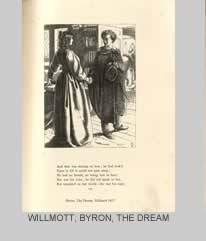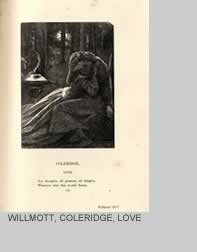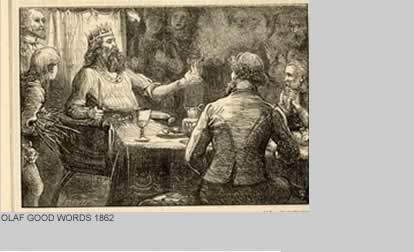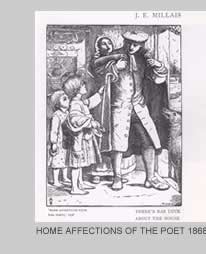Most of the designs for illustrations
to the Reverend Robert Aris Willmott's The Poets
of the Nineteenth Century,
Routledge and Co., London 1857, speak to a previous generation of illustrators,
William Harvey and John Gilbert with their dull little vignettes. The
newer generation is represented by the traditional rustic views of Birket
Foster, then aged 32. Millais' contrasting illustrations, for Byron,
and for Coleridge, announce a wholly new attitude to the visualisation
of verse. In sheer detail and tonal balance they are like nothing else
in the volume. Look at other artistts of the younger generation, Ford
Madox Brown who was given the garish horrors of Byron's Prisoner
of Chillon and Arthur Hughes then aged 25. The latter exercises
the early Victorian fairy mode (Huskisson for example) without daring
much of a forward step. The Editor who identifies himself on the titlepage
as the Incumbent of Bearwood had edited Burns the previous year.
The Plague of Elliant (Once
a Week volume 1) shows Millais in characteristic mood of tragedy
with pain contained by gaze averted. The text was a Breton poem describing
the effects of the Plague on the vilage of Elliant during the sixth
century,
In the centre of Elliant, on the market place,
You will find grass to scythe down,
Except on the cart lane
Which carries the dead to their graves.
Those not crying would be hard-hearted;
Around Elliant, there would not be any:
See the eighteen carts, at the cemetery gate,
And another eighteen arriving there.
There were nine sons in one household,
Who were brought to their graves in a single cartload.
Their poor mother was pulling it.
Their father followed whistling:
He had lost his reason.
She was howling, imploring God,
Broken in body and soul.
The Lament of the Border Widow touches
again on the role played by a woman in death and Millais again selects
a shielding of the face forcing the spectator to speculate on the melodramatic
essence of the narrative without visual clues.
He slew my knight, to me so dear;
He slew my knight, and poined his gear;
My servants all for life did flee,
And left me in extremitie.
I sewed his sheet, making my mane;
I watched the corpse, myself alane;
I watched his body, night and day;
No living creature came that way.
Byron's The Dream provides a favourite
Millais theme of the emotionally steamy couple with the lad taking the
lead (see many other works)
These two, a maiden and a youth, were there
Gazing -the one on all that was beneath
Fair as herself -but the boy gazed on her;
And both were young, and one was beautiful:
And both were young -yet not alike in youth.
As the sweet moon on the horizon's verge,
The maid was on the eve of womanhood;
The boy had fewer summers, but his heart
Had far outgrown his years, and to his eye
There was but one beloved face on earth,
And that was shining on him; he had looked
Upon it till it could not pass away;
LoveHe had no breath, no being, but in hers:
Love also explores the assimilation
of love and passion without expressive features. The couple go into their
clinch moved by the power of narrative and music. Coleridge makes play
of gaze and expression, spurned by Millais for the third time in this
selection.
Oft in my waking dreams do I
Live o'er again that happy hour,
When midway on the mount I lay
Beside the ruined tower...
The moonshine stealing o'er the scene
Had blended with the lights of eve;
And she was there, my hope, my joy,
My own dear Genevieve!...
.........................
She loves me best, whene'er I sing
The songs that make her grieve.
I played a soft and doleful air,
I sang an old and moving story -
An old rude song, that suited well
That ruin wild and hoary.
She listened with a flitting blush,
With downcast eyes and modest grace;
For well she knew I could not choose
But gaze upon her face....
She wept with pity and delight,
She blushed with love, and virgin shame;
And like the murmur of a dream,
I heard her breathe my name.
.............................................
Her bosom heaved -she stepped aside,
As conscious of my look she stepped -
Then suddenly, with timorous eye,
She fled to me and wept.
She half enclosed me with her arms,
She pressed me with a meek embrace;
And bending back her head, looked up,
And gazed upon my face.
 Arthur
Hughes in Willmott Arthur
Hughes in Willmott
 Ford
Madox Brown in Willmott Ford
Madox Brown in Willmott
See also Millais' contribution to the Moxon Tennyson (back
to Menu)
|

























